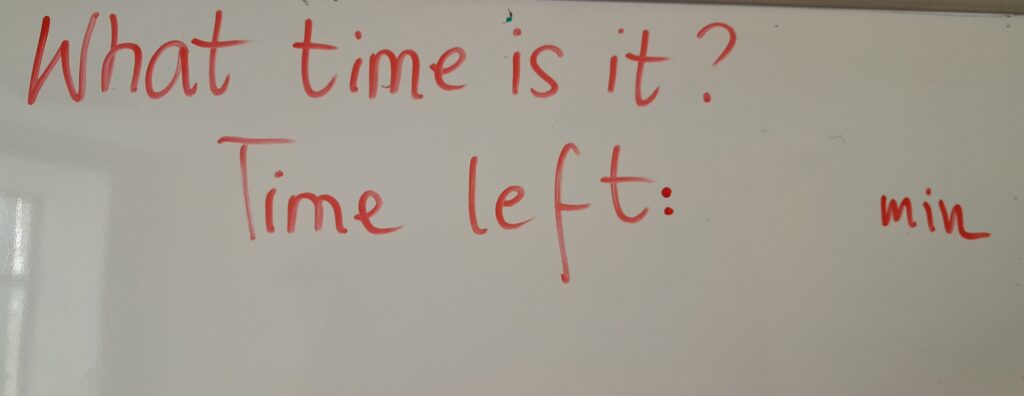
Ingredients
- A board and a marker, with two phrases written on the top: ‘What time is it?’ and ‘Time left:….min’
- A watch for the teacher.

Procedures
- Drill the question with all the kids (‘What time is it?’)
- Every time you hear from the classroom the same or similar question, most probably in the kids’ L1 (‘What time is it?’, ‘When is the break?’, ‘How much time we’ve got left?’) etc, point to the question on the board and elicit it from the group or from one student and only when they do, check the time and write the number of minutes left until the end of the lesson.
- Repeat every time someone asks the question but insist on them asking the question in English.
Why we like it?
- First of all, this trick gives kids an opportunity to learn to control their behaviour in class. I use it with my pre-primary and primary students in a situation in which they cannot tell the time using the clock and they do not have their mobiles to do this using their digital clocks. Not to mention that at the moment we work in an unusual context and each part of the 4-academic hours-long day has a different length. If the kids understand better how much time is left or, in other words, for how many more minutes they are required to ‘work hard’, they are better prepared to manage their behaviour in the time left. Also, it is of a great psychological help to see the minutes disappear and then even if the day is long, even if the weather has an impact on the kids’ energy levels, even if the activities today are not amazingly exciting for everyone, there are fewer and fewer minutes to go through until the next break time, snack break, the walk, the playground and so on. It has been of a great help in all the summer classes.
- The kids are likely to ask this question anyway, directing it at their teacher or their peers so giving them a chance to do it in English is an opportunity to learn and to practise some useful language in a natural context.
- To be perfectly honest, it is a tiny little bit irritating to hear this question and to have to answer it a few times during the lesson BUT the very fact that the question is asked and the frequency with which it is asked is a great source of immediate feedback for the teacher and a signal that, perhaps, some changes need to be introduced in the original lesson plan. Maybe an activity took too long, maybe on that particular day the kids are too energetic or too sleepy for whatever is going on and they need a settler or a stirrer. Perhaps even an activity needs to be abandoned asap, for whatever the reason…Knowing is is much better than not knowing it and proceeding when your audience is not ready for it. That also means that on some days and with some activities, the kids will completely forget to ask the question and that is for the best reason of it. They will be so involved in the activities that the lesson length and the clock will not matter at all.
Happy teaching!